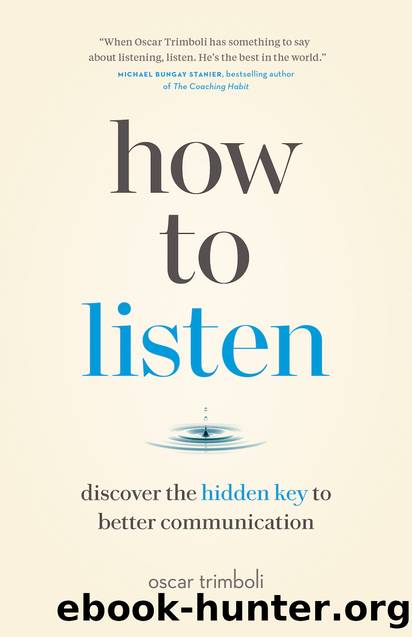How to Listen by Oscar Trimboli

Author:Oscar Trimboli [Trimboli, Oscar]
Language: eng
Format: epub
Publisher: Oscar Trimboli
Published: 2022-10-04T00:00:00+00:00
P.S. Thinking about the workplace listening colleague you chose in chapter 2, are you noticing more about how others are listening to you? Keep practicing with your workplace listening colleagueâand remember: listening is a contact sport.
chapter 5
explore the backstory
* * *
Great listeners influence how speakers tell their story.
I discovered the power of being curious and rewinding to the origins of the story firsthand while listening to community organizer Simon Greer.
The topic of the interview was Greerâs project Bridging the Gap. This project is about teaching university students the communications skills they need to listen when they fiercely disagree with an idea or point of view, rather than simply talking back at the other person with their own ideas. This is an important difference that I need to regularly remember personally.
My opening question was this: âSimon. Weâll spend a bit of time talking about Bridging the Gap. Before we do, do you mind taking me back? What was the conversation that sparked the idea to create it?â
Here was his response:
Itâs always dangerous when youâre asked âtake me back,â because I could go back to when my parents came to the United States on a boat. They came from England in 1965. And to really understand me, you have to understand the part of the Jewish left that I grew up in.
I grew up on the Upper West Side in New York City and Manhattan, when it was still pretty working class, middle class⦠pretty heavily Jewish and left. I went to a summer camp called Camp Kinderland.
And when I say this to people, [that] it was a Jewish communist summer camp, they reply, âOh, you mean liberal?â
No, no, I mean a Jewish communist summer camp.1
This backstory creates an entirely different perspective about Greer, the project, and his part in the project. You understand his history and its circumstances. Later, he revealed more of his parentsâ story. They fled Poland around World War II to arrive in England. After college, this came full circle when Greer took his first job working for Lech WaÅÄsa and the Polish Solidarity movement.
This is the value of the backstory.
You and I feel like we know Simon Greer much better.
We understand how he has arrived at working on a project about communicating when you disagree. We better understand his past relationships and their influence on his ideas and his point of view when listening to disagreements.
With his backstory revealed, now it was time to build on this foundation and the connection to explore the Bridging the Gap project. Now, and only now, could I understand how this project fits into his background and worldview.
Not all speakers commence the story at the beginning. Rarely will they outline each scene, with all the characters and their parts, into a coherent sequence. When the storyâs content is close or personal, speakers tend to start the conversation from their opening scene rather than from the opening scene. When speakers explain the history of an issue, project, relationship, and the connected struggles, they will rarely explain it fully.
Download
This site does not store any files on its server. We only index and link to content provided by other sites. Please contact the content providers to delete copyright contents if any and email us, we'll remove relevant links or contents immediately.
| Bookkeeping | Business Mathematics |
| Business Writing | Communications |
| Decision Making | Negotiating |
| Project Management | Running Meetings & Presentations |
| Secretarial Aids & Training | Time Management |
| Training |
Nudge - Improving Decisions about Health, Wealth, and Happiness by Thaler Sunstein(7687)
Deep Work by Cal Newport(7053)
Principles: Life and Work by Ray Dalio(6397)
The Doodle Revolution by Sunni Brown(4736)
Factfulness: Ten Reasons We're Wrong About the World – and Why Things Are Better Than You Think by Hans Rosling(4727)
Eat That Frog! by Brian Tracy(4508)
Thinking in Bets by Annie Duke(4210)
Hyperfocus by Chris Bailey(4107)
Visual Intelligence by Amy E. Herman(3772)
Writing Your Dissertation in Fifteen Minutes a Day by Joan Bolker(3712)
Ogilvy on Advertising by David Ogilvy(3588)
Hidden Persuasion: 33 psychological influence techniques in advertising by Marc Andrews & Matthijs van Leeuwen & Rick van Baaren(3540)
How to Win Friends and Influence People in the Digital Age by Dale Carnegie & Associates(3537)
How to win friends and influence people by Dale Carnegie(3464)
The Pixar Touch by David A. Price(3426)
Schaum's Quick Guide to Writing Great Short Stories by Margaret Lucke(3368)
Deep Work: Rules for Focused Success in a Distracted World by Cal Newport(3217)
Work Clean by Dan Charnas(3108)
The Slow Fix: Solve Problems, Work Smarter, and Live Better In a World Addicted to Speed by Carl Honore(3001)
